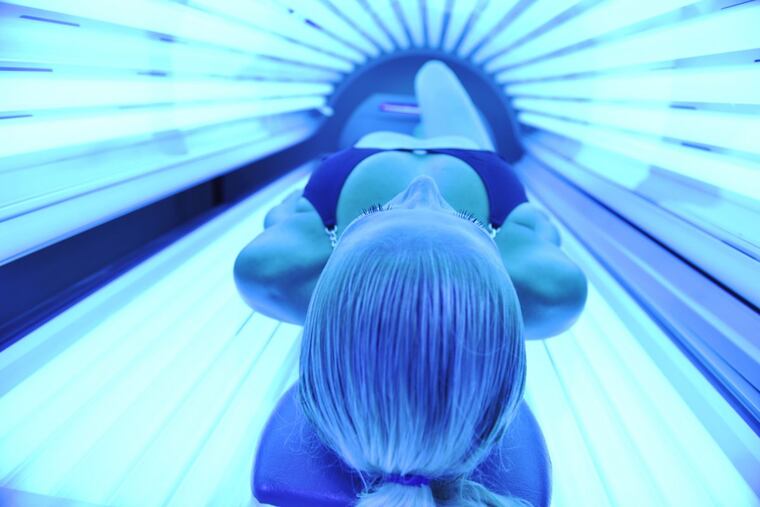As public health campaigns cast a cloud on indoor tanning, salons are going dark
In Pennsylvania, New Jersey, and across the country, a slew of salons are permanently turning out the (ultraviolet) lights, burned by public health efforts to discourage indoor tanning and warn of its skin cancer risks.

It's a dark time to be in the tanning business.
In Pennsylvania, New Jersey, and across the country, a slew of salons are permanently turning out the (ultraviolet) lights, burned by public health efforts to discourage indoor tanning and warn of its skin cancer hazards.
In case you haven't kept track: In 2009, a World Health Organization research group declared UV-light-emitting tanning bed use to be a risk factor for all forms of skin cancer, including deadly melanomas. The next year, U.S. salons were hit with the 10 percent federal "tanning tax" as part of the Affordable Care Act. Then the Federal Trade Commission cracked down on marketing that claimed indoor tanning had health benefits.
On top of that, 42 states, including Pennsylvania and New Jersey, passed laws restricting the use of tanning facilities by minors.
For many reasons, among them indoor tanning, national studies show increases in melanoma incidence and deaths since 1980. The American Cancer Society estimated there were about 76,000 new diagnoses and 10,000 deaths in 2016. However, a recent study found a small but heartening decline in most Northeastern states, which may be due to prevention efforts such as laws cracking down on indoor tanning.
In an in-depth article last year titled "The Twilight of the Tanning Salons," Bloomberg cited data that showed the number of U.S. salons fell from 18,200 in 2008 to 12,200 in 2015, a 30 percent plummet. Chris Sternberg, general counsel at Sun Tan City, one of the nation's largest tanning chains, said more than half of its salons had been shuttered since 2009.
"Morale is horrible," Sternberg told Bloomberg. "If the government's intention was to drive tanning salons out of business, they've been successful."
The former owner of an Indiana tanning chain complained to Bloomberg that the media harped on the dangers of tanning: "I think Cosmopolitan ran an article every month. We knew we weren't going to cure world hunger. … We got to give a mom who had three kids at home a 20-minute break in her day to add some color for a small amount of money."
New Jersey's indoor tanning law took effect in 2013, and Pennsylvania's followed in 2014.
Both states require parental consent for 17-year-olds to tan, and ban anyone under 17. Salons are supposed to register, pay annual fees, post warning signs, and take various safety precautions.
New Jersey's Department of Health, which reimburses county health departments for registering and inspecting salons, currently lists 618 facilities – hundreds of them designated "out of business." That's the status for at least half the salons listed in Camden and Burlington Counties.
Pennsylvania's picture is murkier because compliance with the law has not been great. Only 379 facilities have registered and paid annual fees, and 35 of them have recently closed, according to a Department of Health spokesman. The state doesn't have a current estimate of how many facilities exist, but two years ago, it identified and sent letters to 2,800 tanning bed operators, including in gyms and dormitories.
"We still have [the law] on our radar as an important issue," said Jennifer Keeler, executive director of the Pennsylvania Academy of Dermatology, which lobbied for the legislation. "The problem we ran into was the enforcement aspect." (The academy is currently pushing proposed legislation that would remove obstacles to sunscreen use in public schools.)
In any case, all it takes is Google and Yelp searches to turn up defunct tanning salons in the Keystone State – as well as some angry consumers who paid for tans they never got.
Another possible indicator that tanning salon owners feel beset: Not one of more than a dozen in the Philadelphia area returned calls asking for comment for this story.
Of course, one entrepreneur's misfortune may be another's opportunity.
Courtney Claghorn of Santa Monica, Calif., founded a spray-tanning chain called Sugared & Bronzed five years ago, right out of college. She now has eight salons, including one in Philadelphia, and a ninth on the way.
"I had always loved spray-tanning because I don't tan easily in the sun," she said. "And I grew up in a health-conscious family. I was warned against" using indoor tanning beds.
With improvements in the spray and application techniques, she sees her industry "booming."
"It was fulfilling a need," she said.